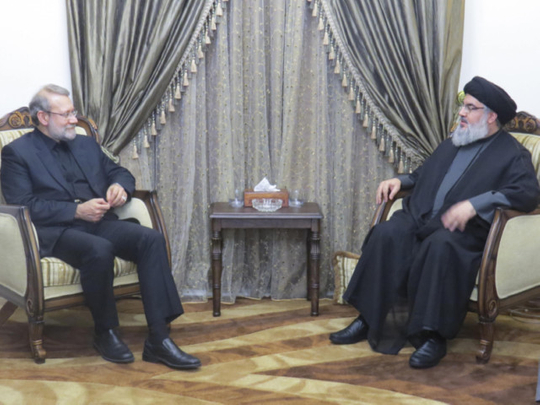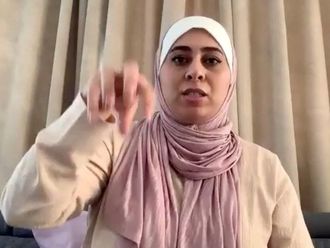
Beirut: As the year comes to a close, observers of the Lebanon political scene acknowledge that no one had a clue as to who the next president would be or when he might be elected.
In 2007, it took deputies six months to decide on a candidate to succeed former president Emile Lahoud, local experts pointed out. The situation in 2014 is far more divisive and it seems to be evident that no elections would occur until a larger agreement between foreign powers was reached.
Save for professional prognosticators that periodically filled the airwaves with soothsayer skills that fulfilled the Lebanese appetite for entertainment, few were ready to hazard guesses as to when there might be an election to fill the post.
Once again, the presidency in Lebanon has become a political football for regional states, which draws succour from established Lebanese rivalries.
Inherent competition between Iran and Saudi Arabia has complicated matters significantly. While Saudi Arabia has traditionally exercised a decisive influence over Lebanese politics, Iran has made considerable headways through its local militia, Hezbollah.
Adding more pressure to the political stagnation is the fallout from the civil war in Syria, which has fuelled Sunni-Shiite rivalries throughout the Arab and Muslim world and has drained Lebanon economically.
However, 2014 saw a far more sophisticated agenda played out by local actors to take the country onto the brink of chaos to serve foreign powers.
For Boutros Labaki, a former high-ranking government official, the ease with which elites settled differences in the past was a lost art form.
“Today,” said the trained economist whose sharp eye on local developments was only surpassed by an equally piercing wit, “there can be no presidential elections without a prior regional accord, something that is not around the corner, even if many believed otherwise.”
It was such an agreement that led parliamentarians to make existential concessions earlier this year when a government was finally formed after Riyadh and Tehran “guided” their local protagonists to spare Beirut a complete political vacuum in the executive branch.
Prime Minister Tammam Salam assembled a functioning government that included March 8 and 14 foes, though the cabinet has struggled ever since to reach routine decisions without falling into the traps of what can only be described as a state of perpetual haggling.
Naturally, the festering mood spilled over into parliament, a moribund institution that barely functioned, into what was a rare global phenomenon best illustrated by its members’ inabilities to agree on a new electoral law, which unabashedly prompted deputies to extend their term until at least 2017.
A full month after this hallucinating decision, and despite modest efforts by a small committee to study various electoral laws, few feel the urgency to assume any responsibilities towards voters.
For now, the March 8 alliance led by Hezbollah deputies and their Free Patriotic Movement allies, stood by Michel Aoun, a troubled 81-year-old candidate who wants the presidency on account of his 19 parliamentary votes among the 64 Christian seats. Aoun’s main foe in the March 14 alliance, led by former Prime Minister Sa’ad Hariri’s Future Movement, settled on the Lebanese Forces leader Samir Geagea.
Beyond the Geagea-Aoun rivalry, which lingered ever since the 1975-1990 Civil War, what differentiated the two men and their respective allies was how to manage Lebanese-Syrian ties.
Aoun, who fled the country and lived in exile in France because he once rejected Syrian domination, and Geagea, who became the only leader to pay a judicial price—11 years in jail including eight in solitary confinement—for the pending conflict, sang contradictory tunes. Aoun flipped from being an anti-Syrian to a pro-Syrian politician after he returned from Paris in 2005—allegedly because Syria pulled its troops out of Lebanon and no longer occupied it—and Geagea received a full parliamentary pardon even if he did not adapt to Damascus.
On the contrary, he blamed Syria and condemned Hezbollah—as well as Aoun—for immersing themselves in the Syrian civil war. Of course, while Geagea offered to withdraw in favour of a candidate acceptable to both sides, the onus was on finding a nominee that would not be beholden to Damascus.
That was not easy when fundamental differences remained. For Ohannes Geukjian, a lecturer in political science and conflict resolution at the American University of Beirut, successive governments were “unable to prevent Lebanon from being sucked into the Syrian maelstrom” that, despite the unanimously approved June 2012 Baabda Declaration that ushered in a policy of dissociation from the Syrian powder-keg, led to an embarrassing performance.
Then Foreign Minister Adnan Mansour violated the Baabda testament when he called for Damascus to be allowed to retake its seat at the League of Arab States during a March 2013 meeting of Arab foreign ministers in Cairo.
This was but a mere illustration of how far apart Lebanese elites were on life and death matters that, not surprisingly, meant that few could agree on a presidential nominee.
One scholar who wished to remain anonymous, summarized the dilemma best when he declared: “No president in Lebanon seems to be working... can we try it here for a couple years?”











